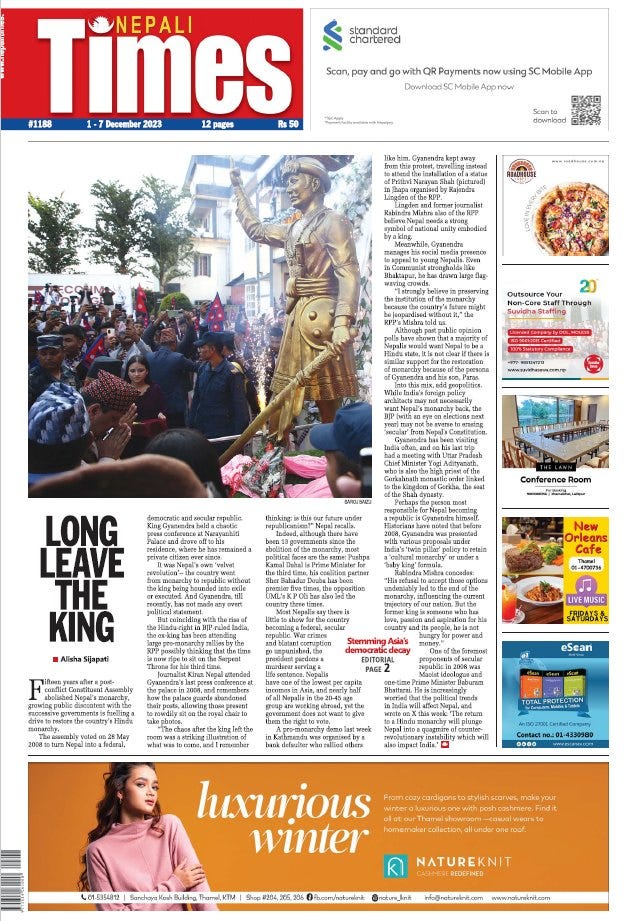Nepali Times ePaper
Dear Nepali Times Reader,
Fifteen years after Nepal abolished its monarchy, there's a growing movement to reinstate the Hindu kingdom due to dissatisfaction with successive governments. King Gyanendra, previously silent on politics, now attends pro-monarchy rallies. Amid concerns about political continuity and governance issues, calls for a return to a Hindu monarchy are gaining traction.
Geopolitical factors, including India's stance and Gyanendra's visits, also play a role. Some argue that Gyanendra is driven by love for his country, while others fear the consequences of a monarchy restoration. Alisha Sijapati's analysis on page 1 this week.
Also watch an interview with Rabindra Mishra of the royal-right RPP:
Other highlights from this week's issue:
The Malaysia-Nepal Migrant Scam Nexus
In Malaysia, hundreds of workers are recruited under quotas obtained by using fake documents. Some of these fake permits are also traded, allowing Malaysian companies to sell the quotas, or rent out trafficked workers. Ramu Sapkota and S Vinothaa investigate.
Hibernating Students of the Himalaya
In Mustang, Nepal, distance learning means relocating entire classrooms to Pokhara during the harsh winter. Since 2004, the government has supported 'mobile schools,' providing funds for students and teachers to move to warmer weather and escape temperatures as low as -20°C. The annual migration occurs from November to March, with students returning to Mustang in spring. Durga Rana Magar reports.
The Subcontinent's Original People Live On in Nepal
The Uranw, an indigenous group in southeast Nepal, worship nature and and do not have temples. They are mostly landless and their population has dwindled to 40,000. Despite living on society's margins with very little visibility, their unique culture and language is not just surviving but thriving. The story of the Uranw people by Sewa Bhattarai.
Listen to the podcast here.
Improving Internet Governance in Nepal
In September 2024, world leaders will convene to address the digital divide through the UN Global Digital Compact. But Nepal's role and readiness for this summit raise questions about its approach to digitisation, legislative actions, and international alliances. Recent government actions, such as banning TikTok and breaking up the old Information Technology Bill, highlight challenges in balancing misinformation management and freedom of expression. Nepal should transition to open-source solutions, establish comprehensive data legislation, and learn from global best practices, writes MP from the RSP Sumana Shrestha.
Ex-soldier Dives into Business and Politics
Unusual for a highland soldier, Capt Dam Bahadur Pun excelled in swimming and diving during his time at the Indian Military Academy. Winning numerous gold medals, he even represented India at the 11th Commonwealth Games in 1978. After retiring, he opened a hotel in scenic Ghorepani and even was elected chair of Annapurna Rural Municipality. He now aims to create a new trekking route and dreams of establishing a diving school in Pokhara to nurture Nepali talent. Aïsha MacDougall profiles Captain Poon.
Have a great rest of the week.
Nepali Times



